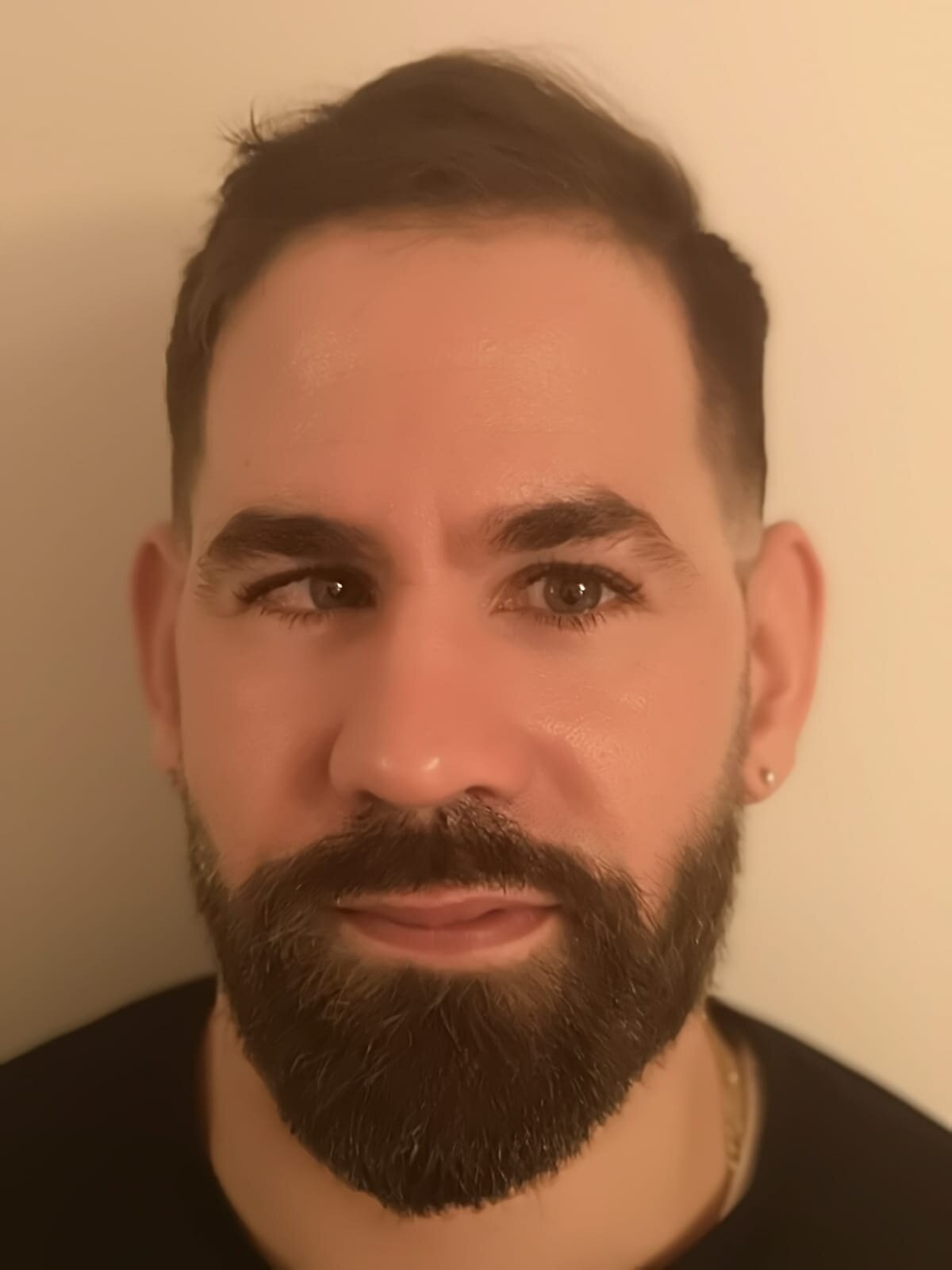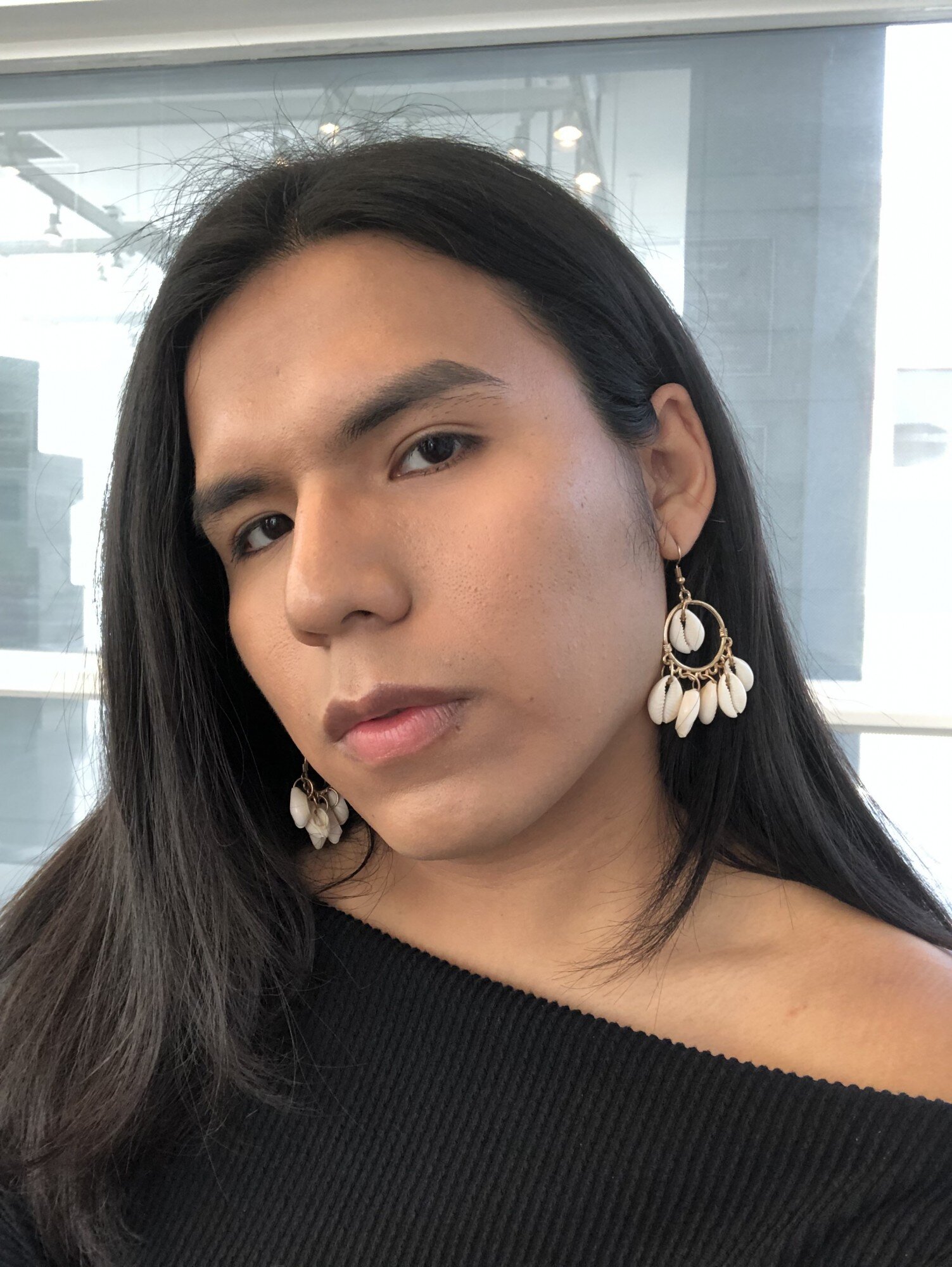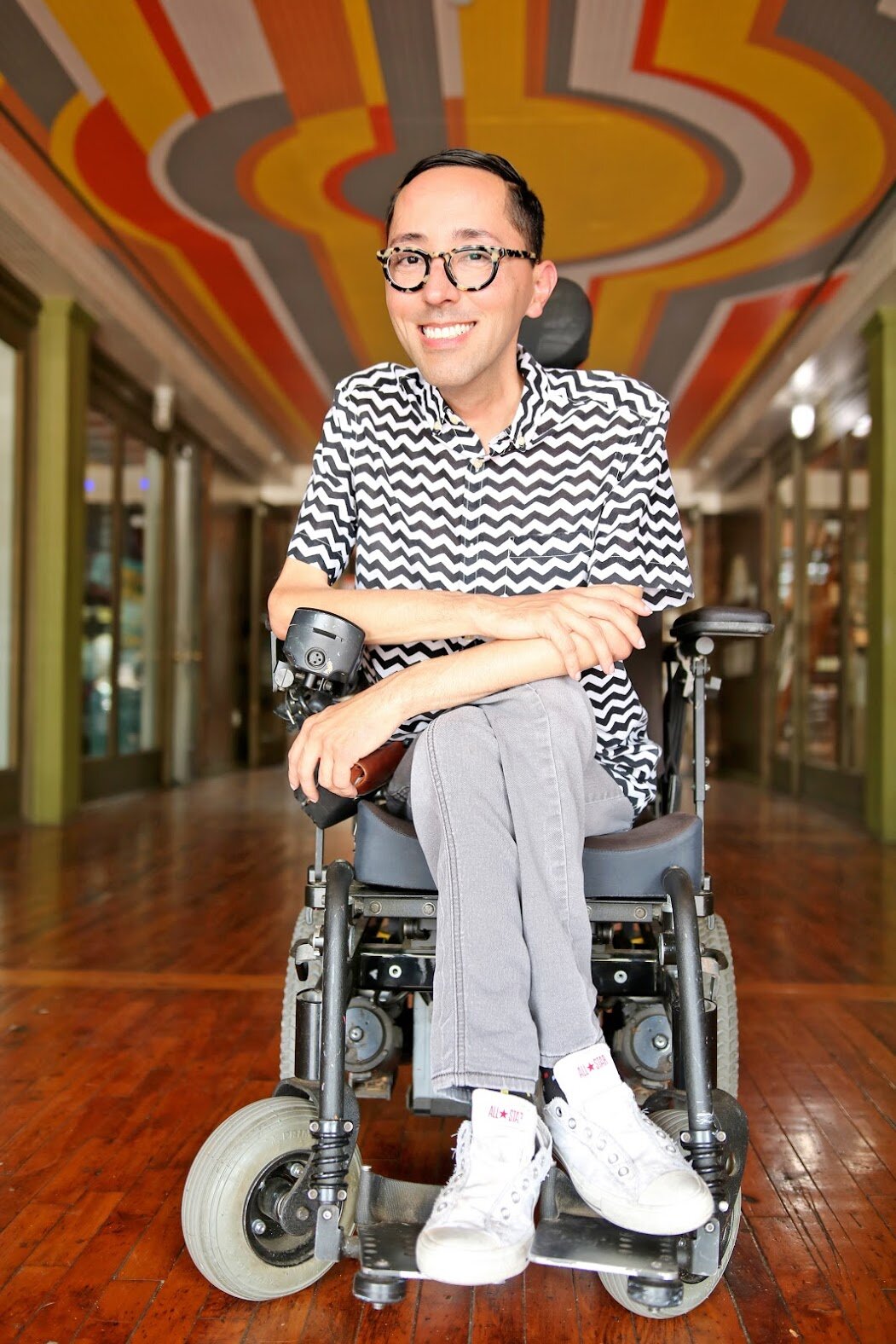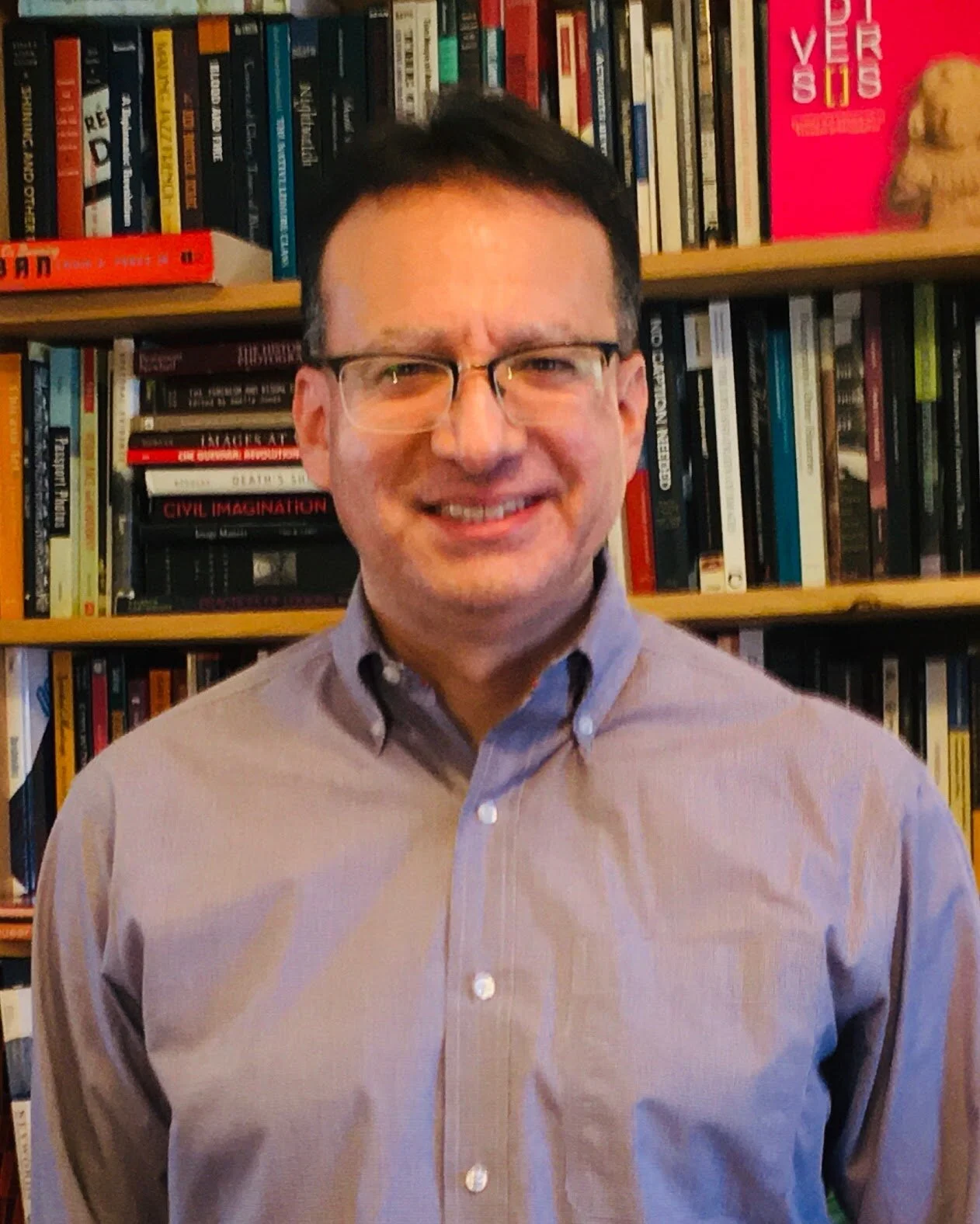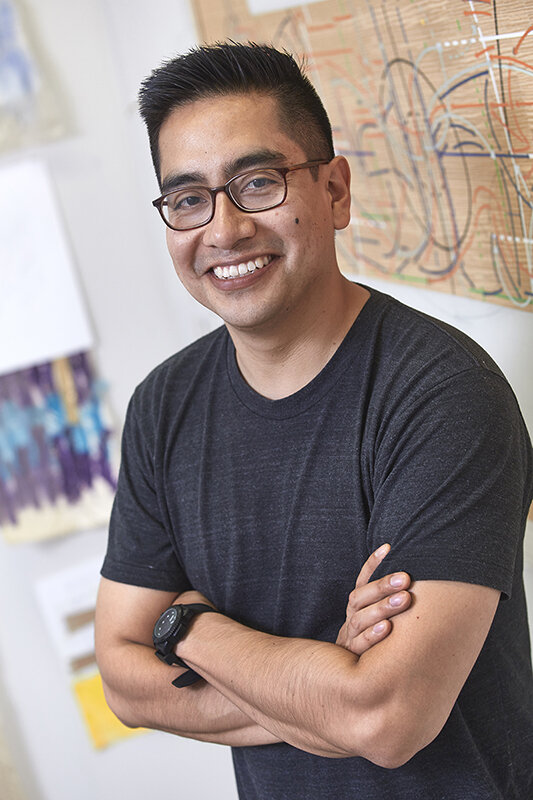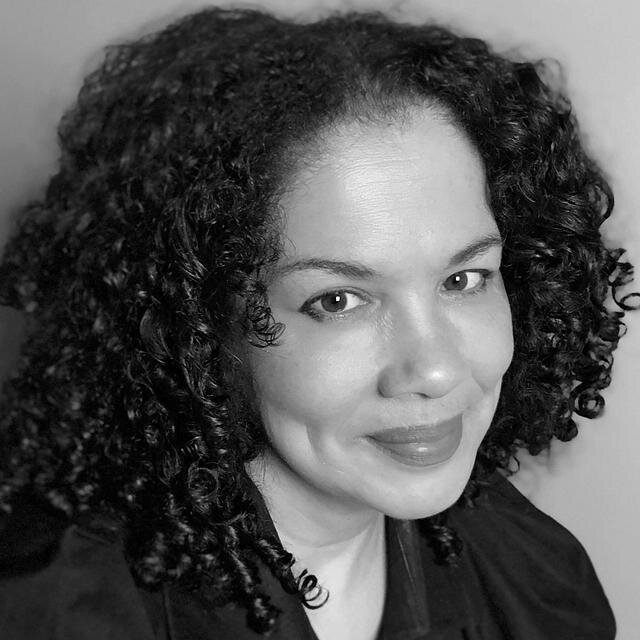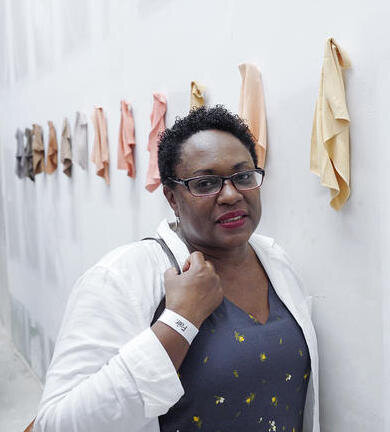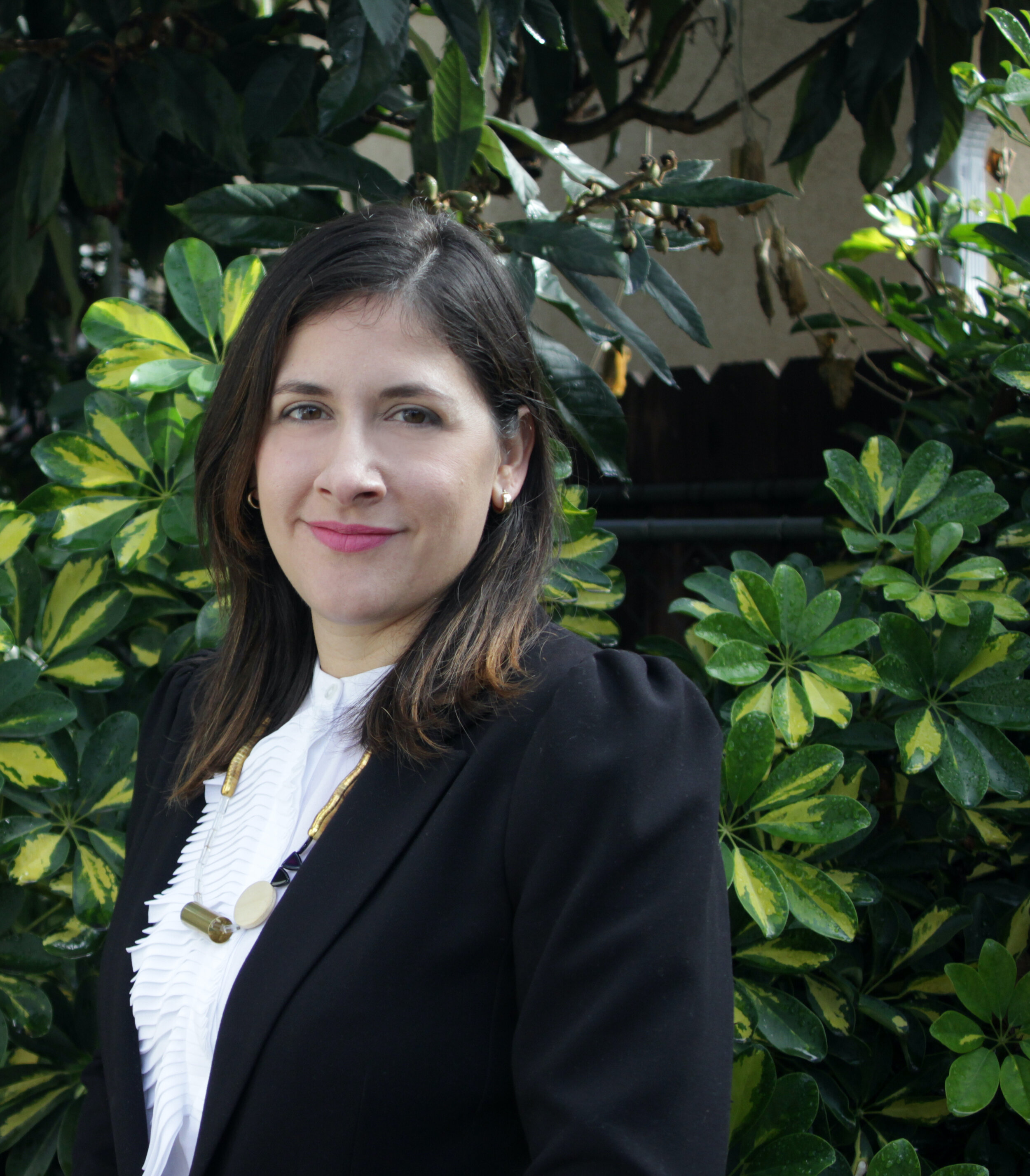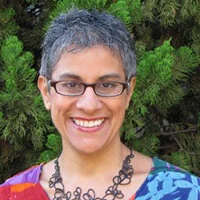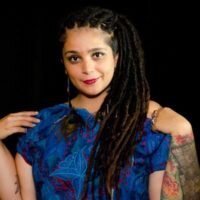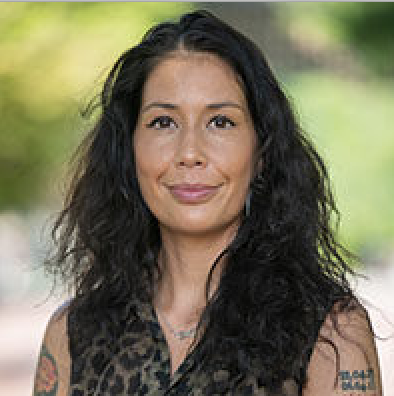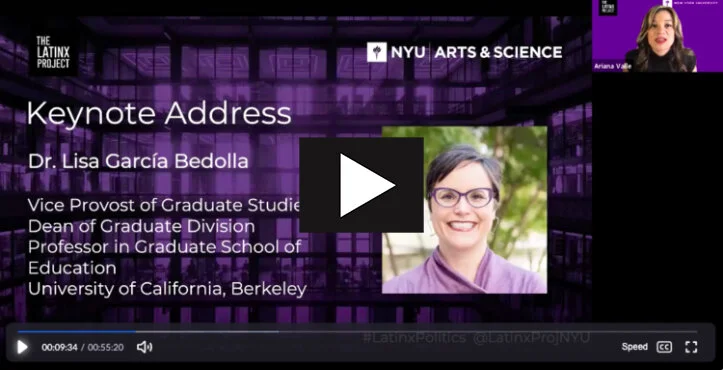
The Future of Afro-Latinx Studies
A symposium featuring applicants to our Inaugural Miriam Jiménez Román Fellowship, with moderators: Lorgia García-Peña - Latinx Studies Scholar and Writer, Zaire Dinzey - Rutgers University, Amarilys Estrella - John Hopkins University, and Omaris Zamora - Rutgers University.
Co-Sponsored by NYU Institute of African American Affairs (IAAA) & Center for Black Visual Culture and Center for the Study of Africa and the African Diaspora (CSAAD).
Image: Danielle de Jesus “For Henrietta Wood”. Oil, acrylic, newspaper and fabric on linen
Click below to watch The Future of Afro-Latinx Studies!

Demystifying Disability: Creatives and the Making/Musings of Latinx
A conversation with disabled creatives that challenges internalized ableism in the Latinx community and society at large. Our panelists will question generalized ideas about bodies, productivity and creativity, moving away from the medical public health conversation around disability. Through art, language and being, panelists explore concepts of culture, bodies, productivity and creativity, interdependency and social justice.
Co-sponsored by NYU Center for Disability Studies.
Panelists
Wilfredo Gomez is a Ph.D Student in Criticism and Culture at the University of Cambridge, Christ's College. His research interests center disability, hip-hop, cultural, and performance studies to examine questions of identity, politics, race, representation, and self-expression in popular culture. Moreover, he is interested in exploring the formal and informal sites where learning and cross-cultural exchange take place. His public writing has appeared in outlets such as the NewBlackMan, LatinoRebels, and the Feminist Wire, while his academic work has appeared in places like Cultural Transformations: Youth and Pedagogies of Possibility, In Media Res:Race, Identity, and Pop Culture in the Twenty-First Century, Pedagogies: An International Journal and The Journal of Latino Studies. He completed his bachelor's degree in political science at Haverford College, and completed master's degrees in English and Africana Studies, at Bucknell University and the University of Pennsylvania, respectively. He has presented work at institutions such as Swarthmore College, Harvard University, Princeton University, and the University of Pennsylvania, amongst other colleges and universities. He has also spoken at the U.S. Social Forum in Philadelphia, where the subject of his presentation was on the disabled experience and the need for a renewed focus on social justice initiatives and a more inclusive policy agenda. He can be reached via Twitter at BazookaGomez84.
Jimena Lucero is a poet, artist, and actor from NYC. She graduated with a B.A. in English from Hunter College. She is a Pink Door fellow and you can find her writing at Colorbloq.org, The Center for Humanities, and more. Jimena has performed at venues like the Brooklyn Museum, Poetry Project, and Flux Factory.
Raul B. Pizarro is a self-taught, Queer Latinx visual artist with muscular dystrophy. Born in Mexicali, Mexico, the third of four siblings, Raul and his family migrated to Southern California - the place that reared him and became home after the age of three. He grew up in the City of Pomona, a short stroll to Pomona’s Artist District. Raul’s professional work bridges diverse themes and spans over 25 years; each piece of art emerges from his experience at the intersection of disability, lgbtq identity, race & ethnicity, family & community. Raul believes art needs to be reclaimed by our communities and embraced by the formal art world. Among his proudest achievements is Raul’s residency with Self-Help Graphics Los Angeles. Raul worked with a master printmaker to produce several prints of “Sharia” and half became part of various Latinx collections at museums and universities nationally. Raul was also one of artists invited to participate in the singular Los Angeles’ Community of Angels project, and this year, Raul was featured in “Preserving Creative Spaces”, a traveling collection of 50 photographs of artists and their studios that will become part of the Smithosonian archives. The dA Center for the Arts was the first gallery to exhibit Raul’s work, and recently hosted his first retrospective which encompassed over 70 pieces including his first painting completed at the age of three, which is when art became Raul’s preferred lenguaje.Nu
Reveca Torres was paralyzed in a car accident as a teenager. After completing degrees in Fashion Design and Theatre Arts, Reveca worked as a costume designer and simultaneously worked with various organizations doing disability work in health, advocacy, recreation, and peer support. She started a nonprofit called BACKBONES after realizing that years of interaction and friendship with others living with spinal injuries (SCI) made a significant impact in her own life. Reveca wanted to ensure that others, especially those newly injured, had access to resources, information, and the same type of support she has had. She is co-director of ReelAbilities Film Festival Chicago and has curated touring photography and art exhibitions that showcase work of people with disabilities and bring awareness to disability rights. Reveca received Creative Access Fellowships at Vermont Studio Center (2014) and Santa Fe Art Institute (2017). She was selected as a fellow for Kartemquin Films Diverse Voices in Docs program (2017) and was one of University of Illinois Chicago 3Arts fellow in 2018. Reveca is one of Documentary Magazine's 2020 Editorial Fellows. She uses painting, illustration, photography, film, movement, and other media as a form of expression and a tool for advocacy and social justice.
Jorge Matos Valldejuli is an Assistant Professor and Reference Librarian at Hostos Community College at The City University of New York (CUNY). Alongside his library work, he also provides support to the Accessibility Resource Center serving students with disabilities on campus. His past experiences with Special Education and mental health issues influenced his interest in Disability Studies. A former librarian at the Center for Puerto Rican Studies Library & Archives at Hunter College, his academic training is in Latin Am/Latinx & Africana Studies. His research documents the history of race and class at the formerly notorious institution for the developmentally disabled, the Willowbrook State School in Staten Island, NY. He is currently writing an article about a predominantly Black and Puerto Rican parents organization that was actively involved in closing Willowbrook during the 1970s and 1980s, the Gouverneur Parents Association. He holds a BA in Political Science from Hunter College-CUNY, an MLS from Queens College-CUNY and an MA in Modern European & Latin American History from The Graduate Center-CUNY. He is a founding member of the National Coalition for Latinxs with Disabilities and is actively engaged in raising awareness of disability issues and scholarship in professional associations such as the Latina/o Studies Association.
The Latinx Project at NYU provides reasonable accommodations to people with disabilities. Requests for accommodations for events and services should be submitted at least two weeks before the date of the accommodation need. Please email Janel Martinez at jm9168@nyu.edu for assistance.
Click below to watch Demystifying Disability: Creatives and the Making/Musings of Latinx!
Jimena Lucero’s Recommended Reading List:
Care Work: Dreaming Disability Justice by Leah Lakshmi Piepzna-Samarasinha
Medical Apartheid: The Dark History of Medical Experimentation on Black Americans from Colonial Times to the Present by Harriet A. Washington
More Than Organs by Kay Ulanday Barrett
Slingshot by Cyrée Jarelle Johnson

NYU Center for the Humanities, Latinx Art, Book Roundtable and Discussion
Hosted by NYU Center for the Humanities and co-sponsored by The Latinx Project, join Ronny Quevedo, Elia Alba, Juana Valdes, and Marcela Guerrero for a roundtable and conversation moderated by Karen Mary Davalos.
Panelists
Ronny Quevedo works in a variety of mediums including sculpture and drawing. His work "posits profound interconnections between the circular movements engendered by sport and the expansive pathways forged by the artist’s personal migration story from Ecuador to the Bronx," Ananda Cohen-Aponte writes in Hyperallergic. His work has been exhibited at The Whitney Museum of American Art, the Queens Museum, Upfor Gallery (Portland), James Fuentes Gallery and Foxy Productions (NYC). Quevedo holds an MFA from the Yale School of Art and BFA from The Cooper Union.
Elia Alba, born in Brooklyn 1962, is a multidisciplinary artist, who works in photography, video and sculpture. She received her Bachelor of Arts from Hunter College in 1994 and completed the Whitney Museum Independent Study Program in 2001. She has exhibited at the Studio Museum in Harlem; Stedelijk Museum, Amsterdam; Science Museum, London; Smithsonian Museum of Art; ITAU Cultural Institute, São Paulo; National Museum of Art, Reina Sofía, Madrid and the 10th Havana Biennial. She is a recipient of the Studio Museum in Harlem Artist-in Residence Program in 1999; Pollock-Krasner Foundation Grant, 2002 and Joan Mitchell Foundation Grant 2002 and 2008; Lower Manhattan Cultural Council (LMCC) Workspace Program, 2009 and Anonymous Was A Woman Award, 2019. Collections include the Smithsonian Museum of Art, El Museo del Barrio, Bronx Museum and the Lowe Art Museum. Her book, Elia Alba, The Supper Club, published by Hirmer, produced by the Shelley and Donald Rubin Foundation, and critically acclaimed by The New York Times, brings together artists, scholars and performers of diasporic cultures, through photography, food and dialogue to examine race and culture in the United States. She is currently guest curator for El Museo del Barrio's upcoming survey of contemporary Latinx art, ESTAMOS BIEN - LA TRIENAL 20/21 opening March 2021.
Juana Valdes is a multidisciplinary artist using printmaking, photography, sculpture, ceramics, and site-specific installations, to explore issues of race, transnationalism, gender, labor, and class. Functioning as an archive, Valdes’s work analyzes and decodes experiences of migration as a person of Afro Caribbean heritage. Born in Pinar del Rio, Cuba, Valdes migrated to the United States in 1971. She completed her M.F.A. in Fine Arts from the School of Visual Arts and her B.F.A. in Sculpture at Parsons School of Design. Valdes is an awardee of the Joan Mitchell Foundation, the Pollock-Krasner Foundation, the National Association of Latinos Arts and Cultures, the Ellies Creative Award, and the New York Foundation for the Arts. Valdes is an Associate professor in the Department of Art at the University of Massachusetts Amherst. Her work is part of the Pérez Art Museum Miami Permanent Collection, and has been included in group exhibitions in museums and university galleries such as Site Santa Fe, El Museo del Barrio, P.S. 1 MOMA; MOCA, North Miami; and galleries in Berlin, Amsterdam, and Sydney. Her most current solo show ‘Rest Ashore’ was at Locust Projects 2020.
Marcela Guerrero is Assistant Curator at the Whitney Museum of American Art, New York. Recently, she was part of the curatorial team that organized Vida Americana: Mexican Muralists Remake American Art, 1925-1945. In summer 2018, Guerrero curated the exhibition Pacha, Llaqta, Wasichay: Indigenous Space, Modern Architecture. From 2014 to 2017 she worked as curatorial fellow at the Hammer Museum in Los Angeles. Prior to joining the Hammer, she worked in the Latin American and Latino art department at the Museum of Fine Arts, Houston. Born and raised in Puerto Rico, Guerrero holds a PhD in art history from the University of Wisconsin, Madison.
Karen Mary Davalos is trained in cultural anthropology, receiving her PhD from Yale and the MA and BA from Stanford University. Currently, she is a professor and chair of Chicano and Latino Studies at the University of Minnesota, Twin Cities. Her research and teaching explore questions of representation, agency, power, spirituality and feminist methods. In 2017 she launched the major initiative, Rhizomes of Mexican American Art since 1848, which will produce a co-authored, multi-volume, full-color book and a shareable, searchable online digital platform linking art collections and related documentation from libraries, archives, and museums.
Click below to watch Latinx Art, Book Roundtable and Discussion!
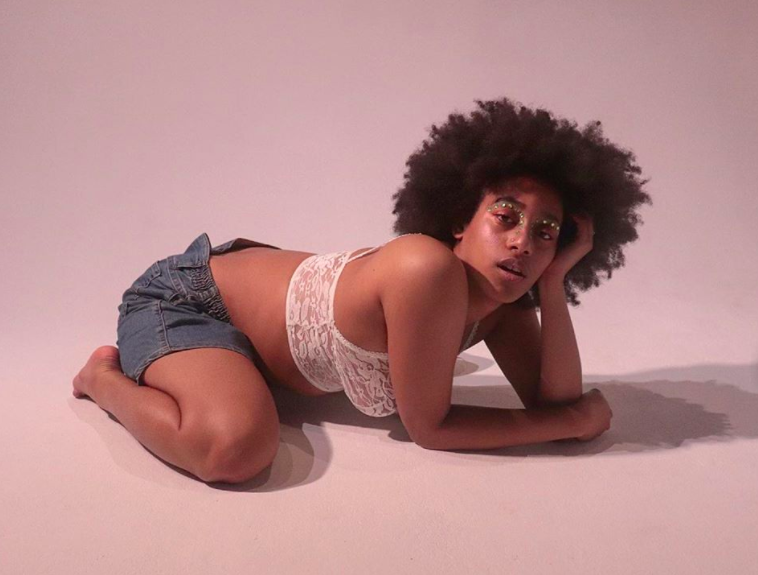
bailar para sanar: Dance Workshop with Moréna Espiritual
This pop up dance workshop presented by experimental artist & dancer Moréna Espiritual is a part of their healing movement series Stardust en el Sur, which highlights Afrolatinx musical narratives. In this session the public will be encouraged to liberate oneself via movement. Cyber visitors will learn how to practice moving their vessels with intention, focusing on the question: how can we participate in care of + through the body in moments of isolation? Put on some comfortable clothing, tune in to zoom, and let’s dance right in your living room.
Learn more about Moréna through their recent interview with Adios Barbie “Embracing Culture, Art and Movement: A Form of Healing”
Event thumbnail photo by @caribbeanpoet

Book Talk, How Migrant Suffering Sustains White Democracy
Cristina Beltrán, Ph.D., works at the intersection of Latinx politics and political theory. She is an associate professor and director of graduate studies in the Department of Social and Cultural Analysis at New York University. From 2001 until 2011, she taught in the Political Science Department at Haverford College; in 2013-14, she was a resident member at the Institute for Advanced Study in Princeton, N.J., and in 2019 she was an advanced seminar member at the School for Advanced Research in Santa Fe, N.M. Her work has appeared in Political Theory, the Du Bois Review, Aztlán: A Journal of Chicano Studies, Political Research Quarterly, and various edited volumes.
She is currently the co-editor of Theory & Event, a peer-reviewed journal that publishes work by scholars working at the intersections of political theory, cultural theory, political economy, aesthetics, philosophy, and the arts. She is also an occasional guest on MSNBC.
Her forthcoming book Cruelty as Citizenship: How Migrant Suffering Sustains White Democracy explores the American right’s deep antipathy toward nonwhite migrants from Mexico and Latin America and examines why acts of cruelty against migrants are so gratifying (and even pleasurable) for many in the Republican Party. Other book projects include Uncertain Identities: Aesthetics, Affect, and the Shifting Politics of Race, a two-volume collection of essays that explores a variety of topics including Latino conservatism, sovereignty and desire, the aesthetics of representation, and the multiracial challenge of working ethically at the intersection of race and political theory.
Natasha N. Iskander, Associate Professor of Urban Planning and Public Service, conducts research on the relationship between migration and economic development. She looks at the ways that immigration and the movement of people across borders can provide the basis for the creation of new knowledge and of new pathways for political change. She has published widely on these questions, looking specifically at immigration, skill, economic development, and worker rights, with more than 30 articles and book chapters on these topics. Her first book, Creative State: Forty Years of Migration and Development Policy in Morocco and Mexico (Cornell University Press, ILR imprint, 2010), looked at the ways that migrant workers transformed the economic development policies of their countries of origin.
Her forthcoming book, Skill & Bondage: Migrant Workers in Qatar and in a Warming World (Princeton University Press, 2021), examines the use of skill categories to limit freedom of movement and narrow access to political rights, in ways that have become increasingly salient with the hardening borders and the pressures of climate change.
Dr. Iskander’s research has been supported by grants from the National Science Foundation, the Alfred P. Sloan Foundation, the MacArthur Foundation, the Social Science Research Council, the Qatar National Research Foundation, and others. She has held positions as a fellow-in-residence at the Zolberg Institute for Migration and Mobility at the New School for Social Research, at the Center for Advanced Studies of the Behavioral Sciences at Stanford University, and at the Global Research Institute at University of North Carolina-Chapel Hill.
Dr. Iskander received her PhD in Management at the Massachusetts Institute of Technology (MIT). She also holds a Masters in City Planning (MCP) from MIT, and a BA in Cultural Studies from Stanford University. In addition to her research, she engages in development work with partners ranging from the World Bank to small NGOs, internationally and in the United States, on issues of urban development, migration and development policy, and migrant worker rights.
Click below to watch Book Talk, How Migrant Suffering Sustains White Democracy!

CYBER HEALING: Digital Space as Safe Space Panel Talk
Join us for the official CYBER HEALING virtual panel talk led by curator Kiara Cristina Ventura where we will be joined by featured artists Florencia Escudero, Moréna Espiritual, Chloe Piñero, Gina Goico, and Catherine Feliz. The conversation will be around the featured works in the exhibition, how the digital world has informed their work, and served as a safe space to explore.
Thumbnail image-
Chloe Piñero, Untitled (2019)
Digital collage, found objects and images, gesso, and hot glue on canvas, 12.25"L x 2.5" W x 14.5"H
Thanks for joining us! Watch the recording below:

Critical Latinx Indigeneities Forum
This forum on Critical Latinx Indigeneities features scholars whose research on Indigenous Latinx cultural politics pushes the boundaries of Latinx, Latin American, Indigenous, and Black studies to provide innovative analyses of race, gender, capital, and power in the contemporary moment. Their research points to the different ways that this field is challenging settler colonial logics of Native erasure, antiblackness, and migrant precarity while advancing transnational conceptualizations of solidarity, decolonization, and Indigenous continuance.
The event will be moderated by Simón Ventura Trujillo whose new book Land Uprising reframes Indigenous land reclamation as a horizon to decolonize the settler-colonial conditions of literary, intellectual, and activist labor. Trujillo argues that land provides grounding for rethinking the connection between Native storytelling practices and Latinx racialization across overlapping colonial and nation-state forms.
Simón Ventura Trujillo is an Assistant Professor of Latina/o Studies in the English Department at New York University. Born in Albuquerque, New Mexico, he teaches and researches on Chicana/o and Latina/o literature, Borderland methodologies, de-colonial social movements, and comparative racialization in the Americas.
Co-Sponsored by NYU Center for the Humanities and the Native Studies Forum.
Panelists
Lourdes Gutiérrez Nájera is an associate professor of Interdisciplinary and Latinx Studies at Fairhaven College, Western Washington University. She teaches courses Citizenship & Belonging, Borders & Boundaries, Globalization and Migration. Her research over the past twenty years has focused on the ways that Zapotec Indigenous people negotiate exclusionary practices of belonging in both the U.S. and Mexico. Most recently, she has also examined the role of settler colonialism in Latinx Indigenous formation processes in the U.S. Her essays have been published in numerous journals including: American Anthropologist, the Association of Mexican American Educators (AMAE) Journal, Identities: Global Studies in Culture and Power, Practicing Anthropology, and American Quarterly. She is also a co-edtior (with M. Bianet Castellanos and Arturo Aldama) of Comparative Indigeneities of the Américas: Toward a Hemispheric Approach (University of Arizona Press 2012), a collection of essays examining key aspects of Indigeneity relationally across the Américas.
Bianet Castellanos is associate professor of American Studies at the University of Minnesota. She is also an affiliated faculty member in the departments of American Indian Studies and Chicano & Latino Studies. For the past three decades, she has collaborated with Maya communities in Mexico and their diasporas in the United States. Her research centers on developing indigeneity as an analytic to interrogate mobility across the Americas. She is the author of A Return to Servitude: Maya Migration and the Tourist Trade in Cancún and the forthcoming book Indigenous Dispossession: Housing and Maya Indebtedness in Mexico. She edited Comparative Indigeneities of the Américas: Toward a Hemispheric Approach (with Lourdes Gutiérrez Nájera and Arturo Aldama), Detours: Travel and the Ethics of Research in the Global South, and the forum “Settler Colonialism in Latin America” in American Quarterly. She is a member of the Critical Latinx Indigeneities Working Group. She teaches courses on comparative indigeneities, Indigenous urbanism, Indigenous migration, rage and politics, popular culture, immigration, tourism, and the U.S.-Mexico border. She serves on the board of El Colegio High School, a Latinx-serving high school in Minneapolis.
Paul Joseph López Oro is an Assistant Professor of Africana Studies at Smith College. He teaches courses on Black Latin American and U.S. Black Latinx social movements, Black diaspora theories and ethnographies, and Black feminisms/queer theory. His research interests include Black politics in Latin America, the Caribbean and U.S. AfroLatinidades, Black Latinx LGBTQ movements and performances, and Black transnationalism. He is working on his first book manuscript, Hemispheric Black Indigeneity: The Queer Politics of Self-Making Garifuna New York, an ethnographic and oral history study on how gender and sexuality shape the ways in which Garifuna New Yorkers of Central American transgenerational descent negotiate, perform and articulate their multiple subjectivities as Black, indigenous and Latinx.
Professor María Josefina Saldaña-Portillo, Social & Cultural Analysis Department & the Center for Latin American and Caribbean Studies at NYU. Indian Given: Racial Geographies across Mexico and the United States (Duke UP 2016) received the 2019 Casa de Las Americans Literary Prize Latino Studies; 2017 ASA John Hope Franklin Book Prize for best work in American Studies; and 2017 NACCS Book Award for best work in Chicanx Studies. With over thirty articles on revolution, subaltern politics, indigenous peoples, racial formation, migration, and Latin American and Latino cultural studies, her most recent, "The Violence of Citizenship in the Making of Refugees: The U.S. and Central America" explores the integral role gendered labor and violence play in Mara Salvatrucha economies of value (Social Text 141: 1-22). She is the Chairwoman of the Coalición Mexicana, an immigrants' rights organization, and an expert witness for Central American asylum cases with legal aid agencies internationally.
Simón Ventura Trujillo is an Assistant Professor of Latinx Studies in the English Department at New York University. His book, Land Uprising: Native Story Power and the Insurgent Horizons of Latinx Indigeneity (University of Arizona Press, 2020), explores Indigenous land reclamation to rethink connections between Native storytelling practices and Latinx racialization across overlapping colonial and nation-state forms. It centers on the cultural production of the New Mexican land grant reclamation movement, La Alianza Federal de Mercedes. A formative organization of the Chicanx movement known for its armed raid of the Tierra Amarilla courthouse in 1967, La Alianza waged a dynamic and controversial campaign for the recovery of Mexican and Spanish land grants that had been lost in the aftermath of the Mexican-American War in the mid-19th century. This book situates La Alianza’s writings alongside a heterogeneous archive of Indigenous and feminist borderland literature by Leslie Marmon Silko, Ana Castillo, Simon Ortiz, and the Zapatista Uprising in Chiapas, Mexico. In doing so, his work explores unexamined intersections between Indigenous, Chicanx, and Latinx cultural politics and contributes to critiques of colonial modernity and settler sovereignty in the Americas. Professor Trujillo teaches courses on Latinx Studies, American ethnic literatures, 20 th century literature and culture, intersectional theories of race, indigeneity, and decolonial social movements. His pedagogy engages the practices of textual analysis, writing, and collaborative research to study how the social construction of identity—including race, gender, sex, class, and nationality— occur as a function of language. His students explore how work on language
generates alternative identities, histories, and spatial imaginaries that resist historic forms of oppression and inequality.
Click the image below to watch the Critical Latinx Indigeneities Forum!

A Mexican State of Mind
A book launch and panel discussion with Melissa Castillo Planas, Ph.D., Audry Funk, and JC Romero. A Mexican State of Mind: New York City and the New Borderlands of Culture explores the cultural and creative lives of the largely young undocumented Mexican population in New York City since September 11, 2001. Inspired by a dialogue between the landmark works of Paul Gilroy and Gloria Anzaldúa, it develops a new analytic framework, the Atlantic Borderlands, which bridges Mexican diasporic experiences in New York City and the black diaspora, not as a comparison but in recognition that colonialism, interracial and interethnic contact through trade, migration, and slavery are connected via capitalist economies and technological developments. This book is based on ten years of fieldwork in New York City, with members of a vibrant community of young Mexican migrants who coexist and interact with people from all over the world. It focuses on youth culture including hip hop, graffiti, muralism, labor activism, arts entrepreneurship, and collective making.
Click the image below to watch “A Mexican State of Mind” book launch and panel discussion!

Latinx Politics – Resistance, Disruption, and Power
Click below to download a special 54-page dossier featuring essays by conference presenters and a keynote interview with Dr. Lisa García Bedolla.
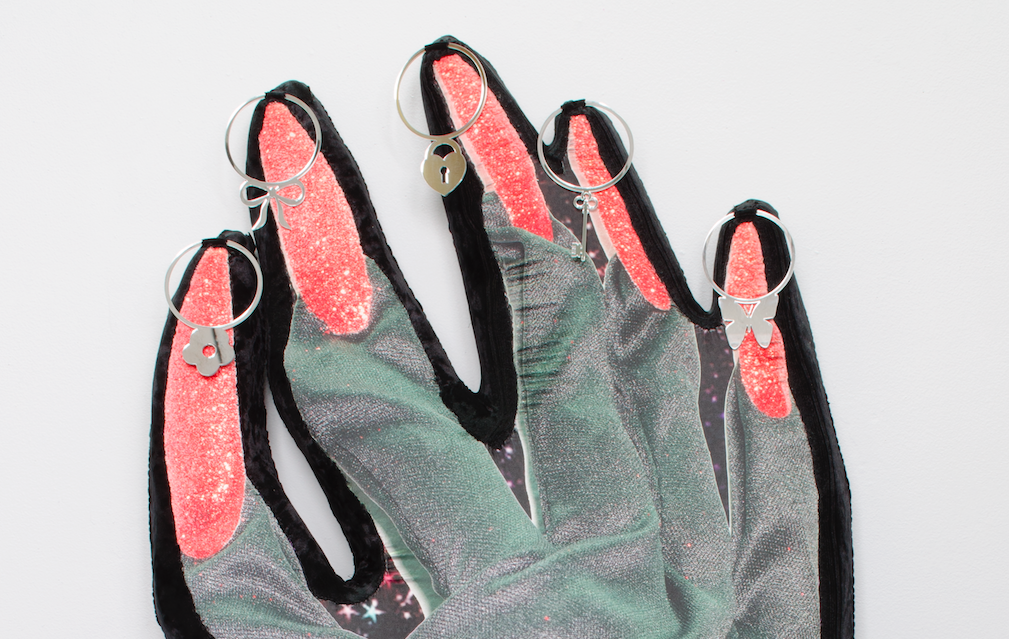
CYBER HEALING curated by Kiara Cristina Ventura
CYBER HEALING, curated by Kiara Cristina Ventura of ARTSYWINDOW, is an exhibition that explores how Latinx and Afro-Latinx artists are healing via feminine energy and digital space. As many of us during the COVID-19 pandemic are deepening our relationships with the digital world, this exhibition raises our contemporary connectivity with the online and social media world to the surface and dissects how we have collectively curated and sourced from online spaces to create discourse, educate, empower, and serve us. Therefore, the digital world of healing has come into fruition within the last decades to be used a tool and has quickly bloomed during 2020 with more creatives seeking to aid one another and themselves.
CYBER HEALING, Sept 4 - Dec 1 2020 - features works by Fannie Sosa, Florencia Escudero, Moréna Espiritual, Chloe Piñero, Gina Goico, and Catherine Feliz. Ranging from video to mixed media to sculpture, the exhibition raises themes speaking to visibility, feminism, queerness, reclamation of the body, decolonization, spirituality, and ultimately how these themes educate and serve healing processes.
About the Curator
Kiara Cristina Ventura (born. 1996) is a Dominican-American Afro-Latina curator, writer, art advisor, and owner of ARTSYWINDOW. Bronx native, Ventura curates spaces highlighting and documenting the works of young artists of color. Ventura’s love for art history began when she interned at The Metropolitan Museum of Art during high school. She then double majored in Art History & Journalism at NYU and graduated in May 2018. Noticing the lack of representation of artists of color in her art history classes and within the larger art world, she responded via writing, curating, and teaching mobile art history classes. She initiated herself as a curator with the exhibition, FOR US. Since early 2019, she has been working alongside curator Larry Ossei Mensah as a mentee, curatorial assistant, and co-curator.
With a love for contemporary art, art history, and spirituality, Ventura is continuing in breaking barriers by independently curating, writing, organizing public programs, and creating digital content. She has curated at The Museum of the African Diaspora San Francisco, The Bronx Art Space, Vis Arts Maryland, Penn State University, The Longwood Gallery at Hostos, The Andrew Freedman Home, and Reparations Club LA. Kiara serves on the advisory board for Bronx Art Space. From August 2019 to May 2020, she started and wrote for Teen Vogue’s first art column, Art School, highlighting the work of visual artists of color through intimate profiles about their experiences, career, and muses. Her writing has also appeared in Art Forum, Performa Mag, Cultured Mag, and more. Ventura’s work has been covered by Art Forum and Art Net.
Catch up with Kiara Cristina Ventura and ARTSYWINDOW at @kiara_cristina.
Q & A with Kiara
Q. Kiara, we are thrilled to have you join us as the guest curator for our first exhibition of the season. CYBER HEALING touches on the post-Covid needs of our community, and the ways in which those needs have become increasingly physical & spiritual. Can you speak about the role of social media in this exhibition, and more generally in emotional mutual aid?
A. I choose to engage with the subject of social media because it’s something that is super accessible to the general public. At the same time, social media platforms like Facebook (who owns instagram) utilizes discrimination tactics attacking the visibility of marginalized communities such as black and brown people, sex workers, the LGBTQ+ community, and more. Similar to the physical world, we have to find and create safe spaces online as well. The digital space allows us to be able to see ourselves in pixelated form. We have the agency to follow or subscribe to the posts of whoever we want therefore being the curators of our feeds. We are able to have constructive (or sometimes destructive conversations) in the comment sections and DMs while being in the safety of our homes. We have the freedom of hopping in and out of the digital world as we please as long as our phone or laptop is charged. At the end of the day when we log off, our spirit is somehow affected by the information and images we consumed. The artists in CYBER HEALING represent a snippet of the energies I interact with on my Instagram feed— energies that I feel transcend the divine feminine. With CYBER HEALING, I’m looking at Latinx, Afro-Latinx womxn, and non-binary artists who are seeking to heal and unapologetically reclaim how the feminine body is portrayed in the digital realm via painting, movement, sculpture, and video.
Q. Can you share a bit about the participating artists and the urgency to share their work at an institution today?
A. I am thrilled to be working with Fannie Sosa, Florencia Escudero, Moréna Espiritual, Chloe Piñero, Gina Goico, and Catherine Feliz who are all challenging societal norms and engaging with digital space as a medium to share stories of visibility, feminism, queerness, reclamation of the body, decolonization, spirituality. I think it’s important to note Latinx artists, especially Afro-Latinx, womxn, and non-binary artists, lack visibility on a national and international level. The only Latina artists I learned about while studying art history at NYU was Frida Kahlo and Ana Mendieta. I love Frida Kahlo but we have so many other narratives to offer and uplift in art history. I hope this exhibition speaks to the urgency of institutional space that needs to be given and taken up in order to properly support marginalized communities within and outside of the art world. What I love about the artists in CYBER HEALING is that they are taking up space in very radical, dynamic, and experimental ways that align with them and their unique practice.
Q. Having double majored at NYU in Art History & Journalism (2018), what is this return like for you?
A. Yes, I graduated over a little more than two years ago and this moment is bringing me back to the last two months before graduation - a time where I was hustling to support myself, I was curating my first official gallery exhibition, and a time where I wrote a letter and initiated discussions with the NYU Art History department about decolonizing their western curriculum. I’ve come to terms with that fact that diversifying the art world is a lifetime commitment and I hope to see the fruits of all of our labor in this lifetime. And by fruit I don’t just mean more visibility but also more pay, documentation, agency, and ownership. I know it takes a large community of artists, curators, directors, writers, organizers, (etc.) to move systems that haven’t been updated in decades. Creating an exhibition on the NYU campus feels very empowering at the moment. Thanks for inviting me back!

Virtual Screening of "Seed/Unseed" by Vick Quezada
Visit our website from June 24-26 for a limited three-day screening of Vick Quezada’s video performance Seed/Unseed. Initially part of Seed/Unseed: Works by Vick Quezada, the 16 minute 1 second video traces the artists journey through a mission route connecting three Catholic churches in the lower valley of El Paso, Texas. Click here for your chance to experience this work, and the exhibition in its virtual entirety.

Food Vendors as Community and Economy Builders in New York
**Please RSVP in order to receive the Zoom login details**
The Center for Latin American and Caribbean Studies (CLACS) and The Latinx Project at NYU present a panel conversation with Mohamed Attia and Carina Kaufman-Gutierrez of the Street Vendor Project. This panel will explore the impact of COVID on immigrant vendors and restaurant workers in NYC. Moderated by Krishnendu Ray, Department of Nutrition and Food Studies, Steinhardt NYU.
Co-Sponsored by the Department of Nutrition and Food Studies at NYU Steinhardt, and the North American Congress on Latin America (NACLA).
About the Event:
The call to recategorize workers across the food system as essential has nationally exposed the deep structural inequality these workers face, making them especially vulnerable during this pandemic. And while many workers, activists, and community organizers understood this inequality long before COVID, the focus on food security has unpenned an opportunity of re-examination and discussion that is rooted in regional explorations of these issues. And while New York City is a world renowned site of a culinary world anchored by restaurateurs and street food vendors, this panel will explore the impact of COVID on immigrant vendors and restaurant workers.
About the Panelists:
Mohamed Attia, is the Director of the Street Vendor Project. He immigrated to the US from Alexandria, Egypt in 2008. He worked as a vendor for nearly ten years selling hot dogs, halal chicken and rice, and smoothies. He became a member of the Street Vendor Project in 2012, was elected to the Leadership Board, and served on the board until 2018, when he joined SVP's staff. He lives in Bensonhurst with his wife.
Carina Kaufman-Gutierrez is the Street Vendor Project’s Deputy Director. She is a Colombian-American who brings experience in nonprofit management, policy development, restaurants, and community organizing within immigrant communities to the team. She has held positions at NYC Small Business Services, Community Service Society, and Fundación Corona. She holds a Masters in International Affairs and Urban Social Policy from Columbia University.
Moderator:
Krishnendu Ray is Associate Professor and Department Chair in Food Studies at New York University. Krishnendu Ray received his Ph.D. in Sociology from SUNY Binghamton in 2001. He holds a master’s degree in Political Science from Delhi University, India. Prior to joining the NYU faculty in 2005, Krishnendu was a faculty member and an Acting Associate Dean for Curriculum Development at The Culinary Institute of America (CIA).
A food studies scholar, he is the author of The Migrant’s Table: Meals and Memories in Bengali-American Households (Temple University, 2004). He co-edited (with Tulasi Srinivas) Curried Cultures: Globalization, Food and South Asia (University of California Press, 2012). His most recent monograph is The Ethnic Restaurateur (Bloomsbury 2016).
Image Credit: Street vendor Roberto Cruz puts on gloves before handling produce, by Gary He.

Essential or Expendable? Latinx Workers in Meatpacking and Agriculture in the US South
**Please RSVP in order to receive the Zoom login details**
The call to recategorize workers across the food system as essential has nationally exposed the deep structural inequality these workers face, making them especially vulnerable during this pandemic. And while many workers, activists, and community organizers understood this inequality long before COVID, the focus on food security has unpenned an opportunity of re-examination and discussion that is rooted in regional explorations of these issues. And while the South is nationally recognized for its foodways, this panel will reframe food production by focusing on those laboring in the Southern Food System.
Presented by the Center for Latin American and Caribbean Studies (CLACS) at NYU.
Co-Sponsored by Food Studies at NYU Steinhardt, The Latinx Project, and the North American Congress on Latin America (NACLA).
About the Panelists:
Mireya Loza (Moderator), is an assistant professor in Food Studies at New York University. Her areas of research include Latinx Studies, Social Movements, Food Systems, and Labor History. Her book, Defiant Braceros: How Migrant Workers Fought for Racial, Sexual and Political Freedom (UNC Press), examines the Bracero Program and how guest workers negotiated the intricacies of indigeneity, intimacy, and transnational organizing. Her book recently won the 2017 Theodore Saloutos Book Prize awarded by the Immigration and Ethnic History Society. Her research has been funded by the Ford Foundation, the Mexico-North Research Network, the Smithsonian Institution, and the National Endowment for the Humanities.
Lariza Garzón is the Executive Director at Episcopal Farmworker Ministry in Dunn, North Carolina. Lariza was born in Bogota, Colombia. She moved to the United States and attended Stetson University in Deland, Florida. Lariza has been working with farmworker communities since 2004, when she was still in college. She is passionate about food production systems and farmworker justice.
Perla M. Guerrero is Associate Professor of American Studies and U.S. Latina/o Studies at the University of Maryland, College Park. She is also affiliate faculty with the Asian American Studies Program, the Center for Global Migration Studies, and the Latin American Studies Center. Her research and teaching interests include relational and comparative race and ethnicity with a focus on Latinas/os/xs and Asian Americans, space and place, immigration, labor, U.S. history, and the U.S. South. She has received multiple awards including two from the Smithsonian Institution to be a Postdoctoral Fellow at the National Museum of American History (NMAH). The first allowed her to work on her book project, Nuevo South: Asians, Latinas/os, and the Remaking of Place, and the second to contribute to the “Our American Journey” Immigration/Migration Initiative, a Smithsonian-wide endeavor with a new exhibit to open at NMAH. Guerrero has published numerous book chapters and articles and presented her work in nationally and internationally. She has also worked with community organizations, non-profits, smaller museums and presented her work in public humanities programs such as the national symposium “Civil War to Civil Rights: The Well-Being of a Nation” and offered a Terp Talk titled “Reactions to a Diversifying U.S. South.”



